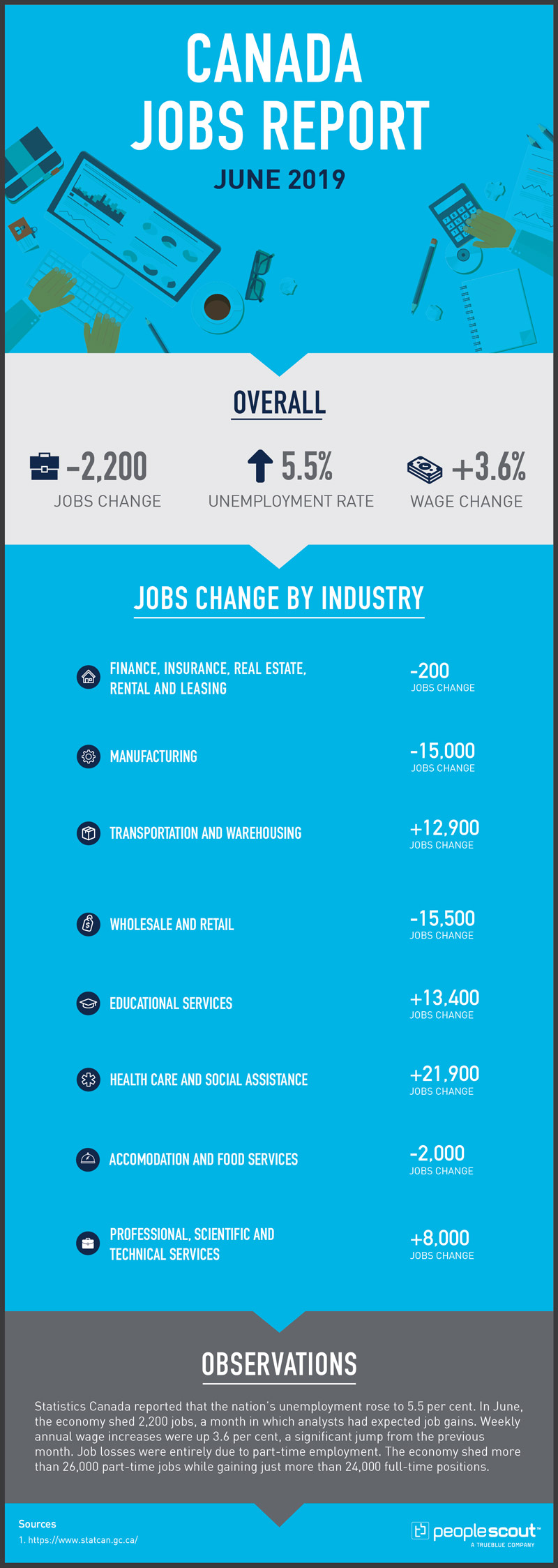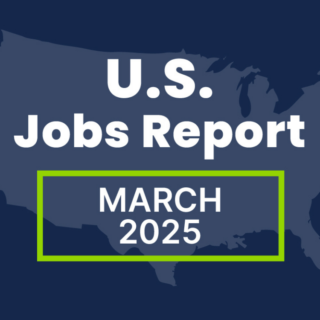Statistics Canada reported that the nation’s unemployment rose to 5.5%. In June, the economy shed 2,200 jobs, a month in which analysts had expected job gains. Weekly annual wage increases were up 3.6%, a significant jump from the previous month. Job losses were entirely due to part-time employment. The economy shed more than 26,000 part-time jobs while gaining just more than 24,000 full-time positions.

The Numbers
-2,200: The economy lost 2,200 jobs in June.
5.5%: The unemployment rate rose to 5.5%.
3.6%: Weekly wages increased 3.6% over the last year.
The Good
Statistics Canada reported that the economy added more than 24,000 full-time jobs and that weekly wages were up 3.6% over last year. This is a marked increase over the 2.2% annual increase in May. The nation’s unemployment rose to 5.5% from last month’s record low, but the increase occurred because more Canadians joined the workforce.
In the second quarter of this year, employment rose by 132,000 with almost all of the new jobs coming from full-time positions. In the last year, employment increased by 421,000 or 2.3%. Most provinces saw little change in their employment level, but both Alberta and Saskatchewan had job increases. In June, there were more Canadians employed in health care and social assistance; educational services; transportation and warehousing; and information, culture and recreation.
The Bad
The headline statistic of the June report is a loss of 2,200 jobs in June, and that could be interpreted as a sign of a slowing economy. More than 26,000 part-time jobs were lost in June. Manitoba, New Foundland and Labrador lost jobs last month. Sectors that had job decreases included wholesale and retail trade, “other services,” manufacturing and natural resources.
Employment in manufacturing dropped by 15,000, which is the first monthly decrease since July 2018. Several provinces had job losses in manufacturing including Quebec, British Columbia and Alberta. Additionally, Canadian production has fallen at its fastest rate in three and a half years, with the decline attributed to trade tensions and uncertainties.
The Unknown
June’s job report showed dramatic increases in annual wage gains. In addition to the weekly annual increase of 3.6%, hourly wages grew a full percentage point over May to 3.8%, the strongest growth in a year and the second best in a decade. In Quebec, annual hourly wage growth hit 5%. It is not clear why there was such a sharp increase in wage gains in June, and it remains to be seen whether this trend will continue. If it does, employers may see an increase in those voluntarily leaving their jobs if they feel that their wages are not rising quickly enough.
However, as the CBC reports, Canada does not have an equivalent to the U.S. Job Openings and Labour Turnover Survey, or JOLTS, which could provide a better picture of the strength of the labor market.
“Julia Pollack, labour economist with the California-based job search company ZipRecruiter,…is one of those who says rising jobs and wages may be part of a trend…Like central bankers, the Harvard-trained Pollack thinks a bit of wage inflation could be a good thing for the economy. And unlike some who think low wages make an economy strong, the private sector economist begs to differ.
‘Rising wages are the way to improve people’s real consumption and living standards,’ said Pollack.
And she said that for those who think they are falling behind, now, during a labour shortage may be the time to put yourself out on the job market.
‘On average, quitting a job leads to something like a seven per cent or eight per cent increase in earnings, and it’s responsible for a pretty large share of overall wage increases over one’s lifetime.’”



